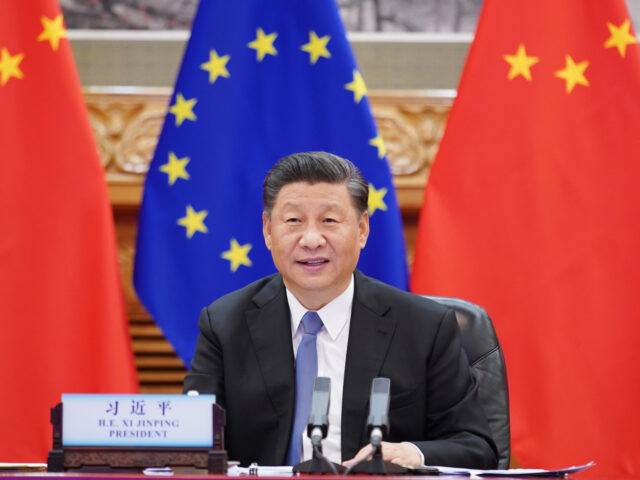The European Union has reportedly been meeting its natural gas needs with increased imports from Communist China, which has been purchasing gas in bulk from Russia.
Beijing’s decision to up its purchases of Russian liquid natural gas since the beginning of the year has seemingly paid off, with the communist nation’s surplus LNG being shipped to the energy-strapped European Union at a premium.
According to a report from the Hong Kong-based South China Morning Post in July, the Chinese state bought 2.35 million tonnes of liquid natural gas during the first half of the year from Russia for approximately $2.16 billion, an increase of 28.7 per cent over last year and the value of which has increased by 182 per cent.
At the same time, imports from all other major LNG suppliers to China have fallen, meaning that Russia has become the Asian nation’s second-largest source of the energy source, overtaking the United States and Indonesia.
Meanwhile, a report this week from the Financial Times noted that due to the economic slump in China amid continued Wuhan virus lockdowns, the communist country has begun selling its surplus of LNG on the international spot market, from which Europe has turned to as it tries to fill its gas storage facilities before the winter months.
With the supply of Russian gas to Europe hitting a 40-year low, the bloc has been willing to pay the premium on the open market to shore up its supplies, as there are concerns that Russia could further cut the taps in the winter months to put the squeeze on Europe, which has heavily sanctioned Moscow over the war in Ukraine.
Consequently the European Union’s imports from the international market have jumped by 60 per cent in the first six months of the year over 2021, totalling some 53 million tonnes.
The result has been a boon for Beijing, with one recent trade from the Chinese JOVO group of an LNG cargo ship to a European buyer netting up to $100 million in profits. The Chinese state-owned energy company Sinopec, alone, has reportedly sold 45 shiploads of LNG, totalling some 3.15 million tonnes on the open market. According to estimates from FT, China has resold some 4 million tonnes on the international market this year, approximately equivalent to seven per cent of the EU’s imports in the six months leading up to July.
The shift of reliance from Russia to China still leaves the EU in a precarious position, given that should China rebound economically, it would likely need to divert its surplus gas back into its domestic market. The reliance also contradicts rhetoric from European leaders about the importance of not relying on authoritarian regimes to meet their energy needs. There is no evidence that China will be any less belligerent towards its neighbours than Russia has been.
However, after decades of spurning domestic production in favour of alleged green alternatives, the bloc is not in a position of strength to accomplish such lofty goals. Ironically, the EU has already been heavily reliant on Communist China to meet its green agenda, with nearly all solar panels in the European Union coming from the Xinjiang region, where up to three million ethnic minorities such as Uyghurs, Kazakhs, and Kyrgyz people believed to have been interned in concentration camps at its peak.
Concerns have been raised that the solar panels are being produced using slave labour in the region, a claim that Beijing has denied.
Yet, the president of the EU ProSun, which seeks to expand domestic solar production in Europe, Milan Nitzschke said last year:“Everybody knows what’s going on in China, and when facilities are based there you have to accept that there’s a high possibility that forced labour will be used.”
Despite evidence of genocide in Xinjiang, and other human rights abuses in places such as Hong Kong and Tibet, leading figures in the EU, such as the President of the European Council Charles Michel have continued to argue in favour of a massive EU-China trade deal to not only bolster economic ties but also to fight allegedly man-made climate change alongside the world’s top polluter.
Follow Kurt Zindulka on Twitter here @KurtZindulka

COMMENTS
Please let us know if you're having issues with commenting.